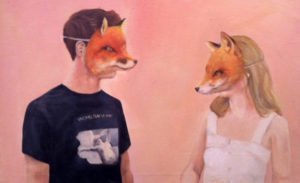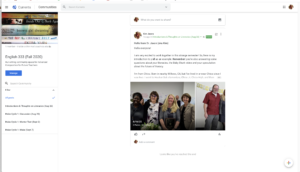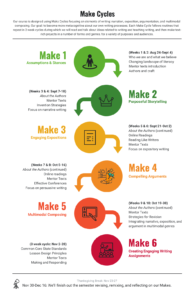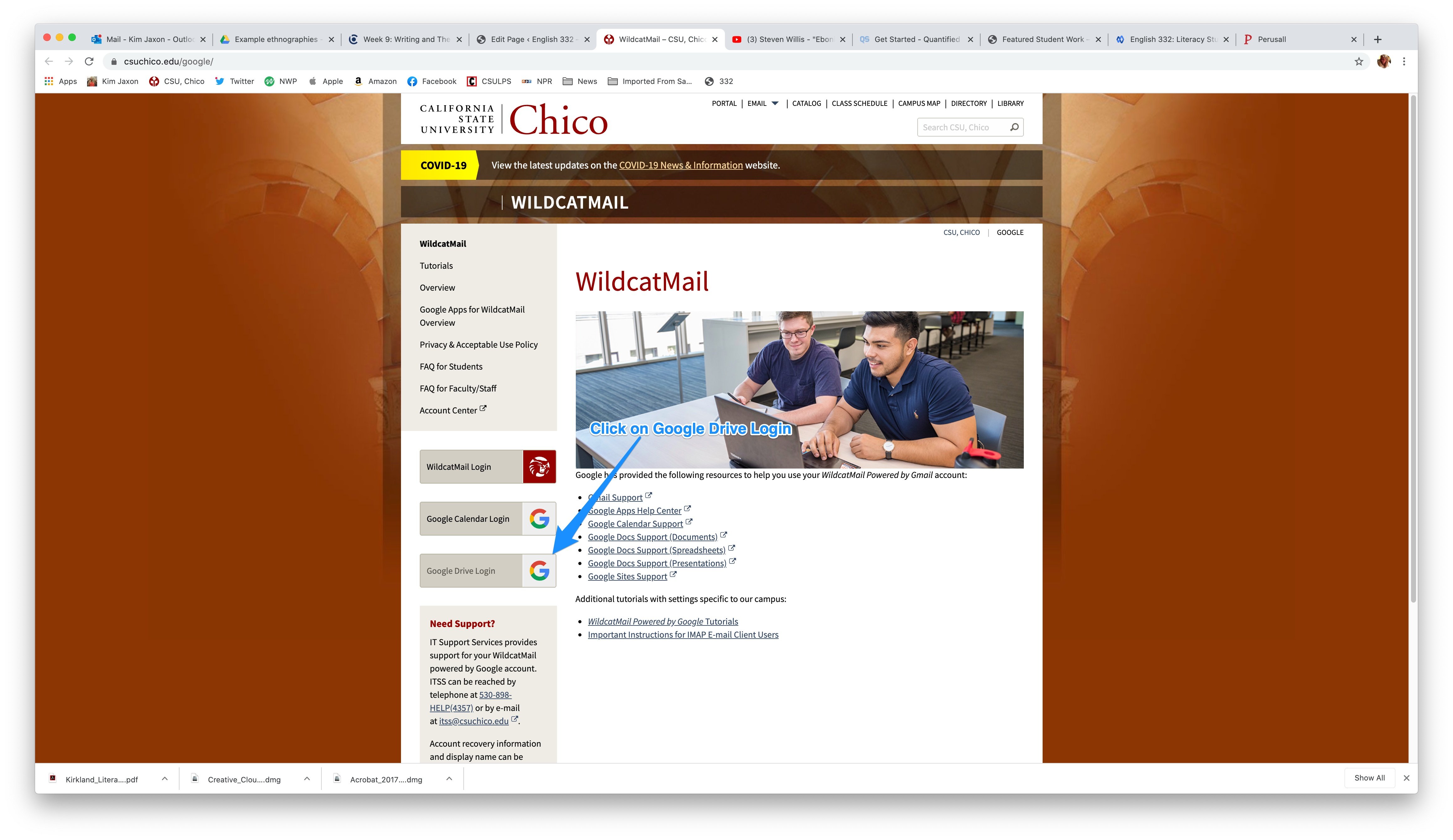Make Cycle 1
Make Cycle 1: Assumptions & Stances
Weeks 1 & 2: Aug 24-Sept 7

Our goal over the next two weeks is to get to know each other and begin to think about ourselves as writers and teachers of writing. We’ll start by introducing ourselves in our shared Google Currents Community. We’ll also do some reading that I hope will broaden our ideas about what “counts” as writing. We’ll respond to those readings as well.
In the second week of this first make cycle, we’ll look at some mentor texts and think about how they might generate some ideas for writing.
Mentor texts are: “pieces of literature that you—both teacher and student—can return to and reread for many different purposes. They are texts to be studied and imitated…Mentor texts help students to take risks and be different writers tomorrow than they are today. It helps them to try out new strategies and formats. They should be basically books that students can relate to and can even read independently or with some support. And of course, a mentor text doesn’t have to be in the form of a book—a mentor text might be a poem, a newspaper article, song lyrics, comic strips, manuals, essays, almost anything.”
We’ll end our two week cycle (as will be usual) with a “make,” a remix of our introductions: either a poem (which you can also video or audio record yourself saying) or a story about you using StoryJumper (or another idea you have)
Due dates and tasks in a nutshell (longer descriptions below):
Make Cycle One: Week 1
- Order book! You’ll need it in hand by Sept 8. 😉 The Chico State bookstore has copies too with options to rent or buy.
- Join our Currents Community. Instructions below.
- By Wednesday, Aug 26: post introduction and short response about literacies to our Currents Community. See prompts for introduction below. Hoping you’ll share an image or even a video with your introductions!
- By Friday, Aug 28: read Andrea Lunsford’s OpEd and watch Jamila Lyiscott’s “3 Ways to Speak English.” You’ll share your response to those readings in Currents. See prompts below.
Make Cycle One: Week 2
- Look over our mentor texts:
- My Name is María Isabel (video below)
- “A girl named Jack” by Jacqueline Woodson
- “second daughter’s second day” by Jacqueline Woodson (see video below)
- By Wednesday, Sept 2: Respond to some prompts to generate ideas with these mentor texts. See prompts below.
- By Monday, Sept 7 (usually Makes are due Sundays, but extra day for labor day): Create a “make”– remix your introduction post into a poem or a story using Storyjumper.
Make Cycle One: Week 1: Aug 24-Aug 28

As soon as possible: Join our Currents Community.
IMPORTANT: you must be logged into your Chico State portal/google drive to join our community. Our Currents Community is only open to people in the Chico State domain.
- Instructions: Log in to your Chico State google: go to http://www.csuchico.edu/google
- Click on Google Drive login
- Log in with your Chico State credentials
- Once logged in, click on our Currents Community Link here<—
- You should see a page that looks something like this:

- Look for Join button on the left and join.
Trouble shooting: If for some reason you do not see the community, and instead, the link goes to a start page for Currents, it might be that your browser is still recognizing another/different account (even though you think you’ve logged in with Chico State). Try a different browser (like Firefox instead of Chrome, or Safari, etc). Or, restart your computer so it clears the login and try again. Let me know if that doesn’t work: kjaxon@csuchico.edu. Don’t stress. I’ll help. 😉 And thank you!
We’ll do most of our writing and sharing in our Currents Community this semester. *NOTE: You can set your preferences for receiving updates from Currents by clicking on the three small dots in the upper left corner. You can tell Currents not to send you an email every time someone posts (this is great as the instructor, but could be annoying as a student). Here is a 20 sec video to show you how to set notifications.
Information about how to post in video below.
By Wednesday night (Aug 26): post an introduction to our group in Currents. This introduction has two parts: 1) your introduction to us and 2) some thoughts about a) your literacies and b) the future of literacy. Some things you could tell us:
Part I:
- Who are you and why are you here?
- How did you end up at Chico State? What are your goals this semester and beyond?
- What are your interests?
- What are you curious about?
Part II
- Write about your own literacies: what do you read and write? What purpose does writing serve in your life? What counts as writing? What about lists, social media, texting, emails, amazon reviews? In what ways do you use writing in your day to day life? How does this writing connect to writing you do for school?
- Then, watch this short video and write about your thoughts: Zoe talks with Alexa
I love this video of Zoe. As a literacy scholar, I place value on all kinds of literacies. This does not make me nervous about the future of literacy because I see literacies as always evolving. For example, I was taught handwriting in the 4th grade in the late 1970’s. Not as useful to me today. What do you think? Use these questions to guide a response to this video: If this video hints at current and future of literacy–interaction with devices through verbal or visual forms–what are the implications for future literacies? Are we returning to an oral, storytelling, culture? How are you communicating with friends and family (emojis, text, GIFs, videos, pictures, all of these things)? How do material forms, like screens, change our literacies and what we’re expected to do with them? What’s up with hashtags, emojis, and GIFs? What uses do we have for various forms of literacy? What counts as literacy and whose literacies count? What are the implications for teaching writing? (No need to answer all of these questions; use them to guide a response)
Post in our Currents Community. Look for the category called “Introductions & Thoughts on Literacies” on the left hand side of our Currents page. Hoping you’ll share (upload) an image or even a video to your post! The picture could be of your dog, a favorite place, of you, etc. As always this semester: Once you’ve shared your post, respond to a peer, make connections to another human.
How to post in Currents (once you’ve joined the community using the instructions above):
By Friday, Aug 28 Read/Watch:
- Read Andrea Lunsford’s, “Our Semi-Literate Youth? Not So Fast”
- Watch Jamila Lyiscott’s “3 Ways to Speak English.”
Then, respond to the readings. I have some guiding questions below that I hope you find useful for your response. You DO NOT have to answer all these questions; they are meant to be helpful in case you’re not sure what to say about these texts yet. Ultimately, I would like you to share what your take-aways are from the reading/viewing and how they compare to your ideas about reading and writing. (I would shoot for three meaty paragraphs in your responses.)
Andrea Lunsford’s, “Our Semi-Literate Youth? Not So Fast”
- Questions to consider as you read Lunsford: What do you think about Lunsford’s claims? Can you relate to her descriptions of youth literacy? Do you think you are more adaptable to the changes in literacy and the changes in audience than previous generations? What do you think about her address to educators: how can educators keep current with literacy’s changes?
Jamila Lyiscott’s “3 Ways to Speak English”
- Questions to consider: Does your family speak a language in addition to English at home? Does your family only speak in a language other than English at home? Do you speak a variety of languages? When do you decide to use different languages? Have you ever been cautious about when to speak in one language over another?
- And/OR How does your language and identity shift in different contexts? Does your family have an insider language (movie references, for example?) that would be confusing to someone outside the family? Do you talk with your friends differently than bosses or professors? As educators, how can we celebrate language diversity?
Post in Currents. Look for the category called “Make Cycle 1: Discussion.” As always: Once you’ve shared your post, respond to a peer, make connections to another human.
Make Cycle One Week 2: Aug 31-Sept 7
By Wednesday, Sept 2:
Watch/Read/Listen to our mentor texts and write response:
- Chapter 2 from My Name is María Isabel, by Alma Flor Ada (you might also enjoy this interview with the author here)
- A girl named Jack by Jacqueline Woodson (<–scroll down on the page to find this poem. It begins with “Good enough name for me, my father said…”)
- second daughter’s second day (audio and images):
Respond to the readings (mentor texts) for this week:
- What are some features of these texts that resonate with you? What are some of your favorite lines? Why? How might we use these texts as models for our own writing? What elements would you borrow? (themes, favorite lines, ways of storytelling, word choices?)
- You can find example responses from past semesters on our Example Student Work page. Scroll down toward the bottom of the page to see many examples for writing about mentor texts.
Post in Currents. Make Cycle 1: Mentor Texts by midnight(ish) Sept 2
By Monday, Sept 7: Your first make!
For this first make, you’ll remix your introduction posts by either writing a poem about yourself OR by telling your story through Storyjumper. Storyjumper is a great platform to use with small kids so you might want to try it out for use in your future classroom. If you have another idea for a Make this week (perhaps a video, slam poetry, another storytelling platform that you like that is similar to Storyjumper (there are lots)?) then let me know. You should enjoy doing this. 😉
You could: write about how you got your name, the story of your birth, stories about your curiosities…really, anything about you.
Ways to get started: Try out your own brainstorming (you don’t have to share): what is the story of how you got your name? Were there debates about your name? What is your relationship to your name or nicknames you’ve been given? What would others say you are curious about? You could even tell us why you want to be a teacher…
- Share your makes in Currents: Make Cycle 1: Make. You can share the link from your Storyjumper (*Note: make sure you are sharing from the “Share” tab in Storyjumper; we should see a thumbnail image of your story in your post) or write out your poem: include an image (drawing done by you or a photo taken by you) with the poem or record yourself reading your poem. If you want to share video, you can upload the video to your Google Drive or to YouTube and share the link in your post.
- Also, remember to write a brief reflection on the make, explaining what you were trying to do with the make and the techniques and processes you used in creating it. What elements did you borrow from the mentor text(s)?
Here’s an example Storyjumper from a previous semester from Elizabeth (love that she recorded her voice reading the story):
 You can find our current Make Cycles in the drop down menu and on the
You can find our current Make Cycles in the drop down menu and on the 